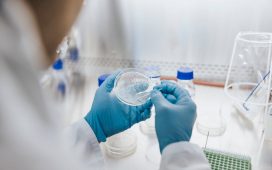A clinical trial to test the effectiveness of a “poo transplant” for people with advanced liver disease is being launched in the UK.
The Promise trial will investigate whether consuming freeze-dried stool – or “crapsules” – can improve the gut health of patients with cirrhosis, a condition where the liver is scarred and permanently damaged.
Research suggests patients with liver damage have higher levels of “bad” bacteria in the gut compared with healthy individuals.
This makes them highly susceptible to infections which can be hard to treat with antibiotics, according to the scientists involved in the clinical trial.
Liver disease is the third biggest cause of premature death in working age people, with about 40 deaths each day, according to the British Liver Trust, who are collaborators in the trial.
The ‘crapsules’, which have none of the taste or smell as the name suggests, may offer new hope for patients with cirrhosis who are out of treatment options
Professor Debbie Shawcross, King’s College London
Dr Lindsey Edwards, from King’s College London, which is leading the clinical trial, said: “Infections, especially resistant infections, are a death sentence to liver patients.
“Patients with chronic liver disease are often prescribed antibiotics, however, they are at high risk of multidrug-resistant infections.
“This is contributing to the global health crisis of antimicrobial resistance.
“There is an urgent and unmet need to tackle infection and antimicrobial resistance in chronic liver disease.
“If we can boost liver patients’ own immunity to reduce infections by modifying the microbiome, we can reduce the need for the prescription of antibiotics.”
About 300 people with liver disease will be taking part in the trial funded by the National Institute for Health and Care Research UK (NIHR).
Finding new, effective ways to treat resistant bacteria is one of the most important challenges in global medicine and this could provide a solution that could save healthcare systems across the world millions of pounds
Pamela Healy, British Liver Trust
They will test whether stool from healthy people, which are freeze-dried into capsules that can be ingested, reduces the likelihood of getting an infection.
A previous trial by the research team, which involved 32 people, has shown faecal microbiota transplant (FMT) to be safe and feasible.
Patients will be recruited from up to 16 sites across the UK, including hospitals in London, Wales, Gateshead, Leeds, Newcastle, Nottingham, Derby, Liverpool, Glasgow, Dundee, Bristol, Plymouth and Portsmouth.
They will be randomly allocated to receive either freeze-dried stool capsules or a dummy tablet every three months for two years.
Professor Debbie Shawcross, from King’s College London, chief investigator in the trial, said: “The ‘crapsules’, which have none of the taste or smell as the name suggests, may offer new hope for patients with cirrhosis who are out of treatment options.”
Pamela Healy, chief executive of the British Liver Trust, said: “This exciting new research also has wider implications – potentially in the future it could tackle antimicrobial resistance.
“Finding new, effective ways to treat resistant bacteria is one of the most important challenges in global medicine and this could provide a solution that could save healthcare systems across the world millions of pounds.”












